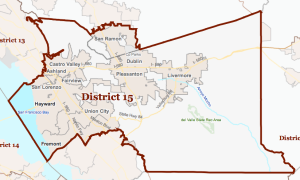Editor’s note: The presidential nominating contests in both parties will come down to the California primary.
For Democrats, 548 delegates are at stake — 11.5% of the total. For Republicans, 172 delegates are at stage — 6.9% of the total. Of those, for Democrats, 158 (29%) are divided proportionally on a statewide basis, while 317 (58%) are divided proportionally by congressional district, with each district providing between 5 and 8 delegates. The remaining 73 (13%) are “superdelegates.”
For Republicans, 13 (8%) are awarded statewide, with ten going to the candidate with the highest number of votes on a winner-take-all basis, and three going to “pre-determined” delegates (the State Chair, National Committeewoman, National Committeeman). Meanwhile, 159 (92%) are awarded by congressional district on a winner-take-all basis, with each district providing 3 delegates.
The result: a district-by-district battle in both parties, which we preview for you here.
CA-15: The affluent, family-friendly East Bay district boasts significant high-tech and research infrastructure. Moderate Democrat Rep. Eric Swalwell has proposed a technological solution to congressional absenteeism: let members vote from afar. About one-third of residents were born abroad. The district, which combines both city and suburb across the lush green hills, is home to Trump-hating avant grade artist Andrew Kong Knight.
Prospects:
Democrats: This moderate, wealthy, high-tech and immigrant-heavy district should be a stronghold for Clinton.
Clinton 5, Sanders 2
Republicans: Kasich should do well here, as will Trump, but Cruz will have slightly better organization in this target district.
Cruz 3, Trump 0, Kasich 0
Joel B. Pollak is Senior Editor-at-Large at Breitbart News. His new e-book, Leadership Secrets of the Kings and Prophets: What the Bible’s Struggles Teach Us About Today, is on sale through Amazon Kindle Direct. Follow him on Twitter at @joelpollak.


COMMENTS
Please let us know if you're having issues with commenting.